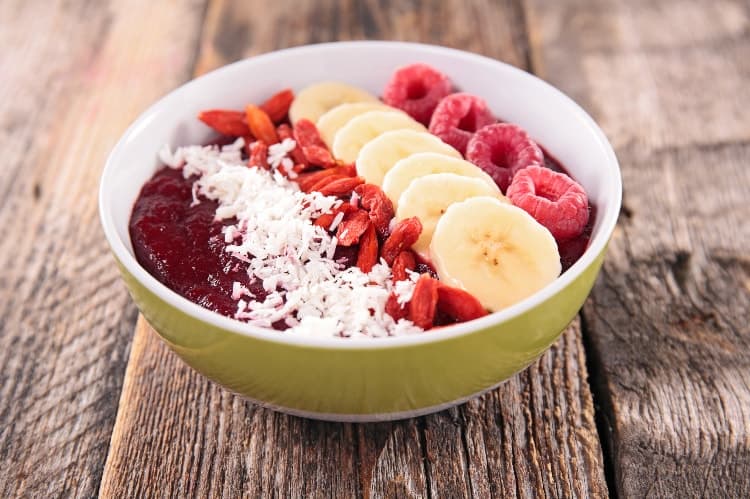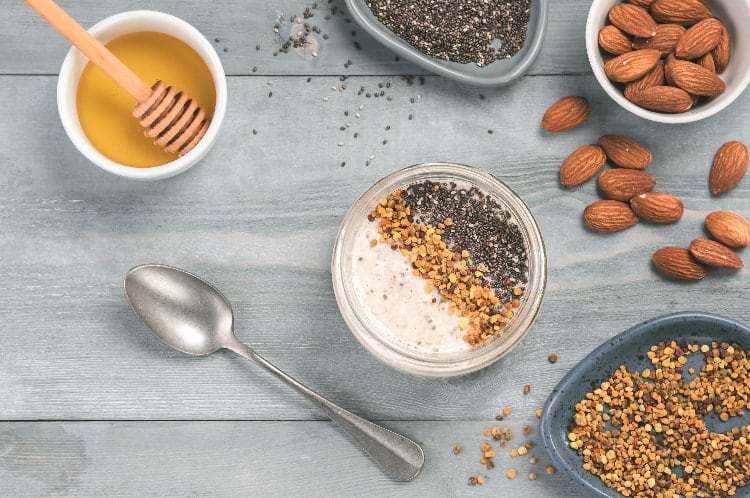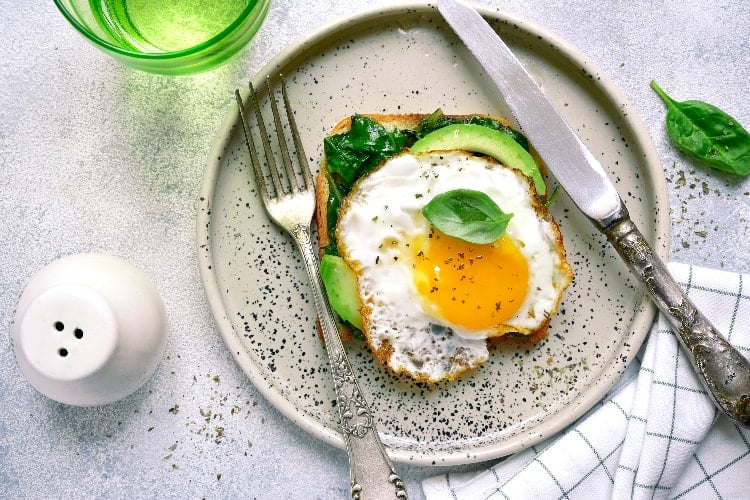
Tips For More Hormone-Friendly Breakfasts (& What Not To Do) 🌞
1. Start Your Day with Protein Power 💪
Protein-rich breakfasts can help regulate hormone levels throughout the day. Include foods like eggs, Greek yogurt, or plant-based protein sources like tofu or chia seeds. These options provide a satisfying and hormone-balancing start to your morning.
2. Embrace Healthy Fats 🥑
Healthy fats are essential for hormone production and balance. Add sliced avocado, nut butter, or a handful of nuts to your breakfast. These options not only nourish your body but also keep you feeling full and satisfied for longer.
3. Include Fiber for Gut Health 🌾
Fiber-rich foods support a healthy gut, which is vital for hormone metabolism. Incorporate whole grains, fruits, and vegetables into your breakfast. Opt for oatmeal, berries, or a side of steamed greens to ensure you get an adequate dose of fiber.
4. Limit Added Sugars 🚫🍭
ADVERTISEMENT
ADVERTISEMENTKate Spade Autumn/Winter Sale |
Avoid starting your day with sugary cereals, pastries, or sweetened beverages. Excessive sugar consumption can disrupt hormone balance and lead to energy crashes. Opt for natural sweeteners like honey or maple syrup if you need a touch of sweetness.
5. Balance Your Carbohydrates ⚖️
Choose complex carbohydrates over refined options. Whole grain toast, quinoa, or sweet potatoes are better choices as they provide sustained energy and help prevent blood sugar spikes that can impact hormone levels.
6. Be Mindful of Caffeine Intake ☕
While a morning cup of coffee can be enjoyable, excessive caffeine consumption can disrupt hormonal balance. Consider limiting your intake or opting for herbal teas that offer calming benefits like chamomile or peppermint.
7. Hydrate, Hydrate, Hydrate! 💦
Start your day by hydrating your body. Proper hydration supports optimal hormone function and overall well-being. Drink a glass of water or enjoy a refreshing herbal infusion to kickstart your morning.
Conclusion
By following these hormone-friendly breakfast tips, you can set yourself up for a balanced and energized day. Remember to prioritize nutrient-dense foods, balance macronutrients, and make conscious choices that support your hormonal health. Start your mornings right and enjoy the benefits throughout the day!
Even though breakfast is just one of many meals of the day, it really has the ability to set the tone for all other meals.
After all, it’s generally easier – both physically and psychologically – to eat healthy all day if you start the day with healthy choices.
But when you’re struggling with a hormonal imbalance, knowing what a “healthy breakfast” looks like can be tricky and frustrating.
So, in this post we’re going to look at:
- two important hormones and how they fluctuate throughout the day.
- what a good hormone balancing breakfast looks like.
- some simple breakfast ideas for balancing hormones.
My hope is that by the end of this post you will see that putting together a healthy breakfast for your hormones is actually quite easy and doesn’t require a magic wand 🙂

HOW A HEALTHY BREAKFAST HELPS YOUR HORMONES
Even though the term “hormone balance” is very common, the reality is that your hormones are not in a fixed state.
ADVERTISEMENT
ADVERTISEMENTSports Direct Free Delivery on All Orders! |
Rather, your hormones are always fluctuating and adjusting in response to various conditions (and in response to each other).
To illustrate this, we’re going to look at cortisol and insulin, and how they adjust throughout the day.
Please note that while there are dozens of other hormones we could cover, I’m focusing on these two because balancing them has a positive ripple effect on many other hormones.
Cortisol Levels and Your Hormone Balance Breakfast
Cortisol is an anti-inflammatory hormone that the body releases throughout the day in response to various emotional and environmental stressors.
In the right amounts, cortisol is a life-saving hormone that helps your body fight off stress and return to a balanced state.
And cortisol follows a natural biological rhythm, known as the diurnal rhythm. This diurnal rhythm is closely tied to the circadian rhythm which regulates sleep/wakefulness.
So, based on the diurnal rhythm, here’s what happens to cortisol throughout the day:
- Dips at bedtime.
- Is lowest around midnight.
- Progressively increases throughout the night.
- Peaks when we wake up (it’s actually the trigger that wakes us up). This peak also gives us a boost of energy and increases our appetite. That’s why we feel the need to eat breakfast (which further boosts energy).
- Starts to taper off progressively during the remaining morning hours and throughout the rest of the day.
Since cortisol is produced in response to stress/inflammation, it’s important to avoid foods that add chemical stress to the body.
This means staying away from sugary foods and highly refined foods.
Instead, focus on anti-inflammatory foods.
By taking this approach you’ll be helping your body improve symptoms like:
- weight gain
- thyroid dysfunction (when cortisol is chronically high, thyroid function becomes down-regulated)
- acne
- fatigue and exhaustion
- mood swings
- chronic inflammation
- sleep disruption
- low sex drive
- brain fog
- high blood pressure
- hair loss
Insulin And Your Hormone Balance Breakfast
Carbohydrates in our diet are the main source of energy for the brain and the rest of the body.
ADVERTISEMENT

ADVERTISEMENT
Anya Hindmarch - I AM A PLASTIC BAGAnd any carbohydrates that we eat are converted to glucose, which is the body then uses for energy.
And in order for your cells to take in that glucose, you need insulin.
Now, since our energy requirements change throughout the day, that means insulin and blood sugar levels are also in constant flux throughout the day.
Generally speaking:
- Your body releases a small amount of insulin at night in order to control blood sugar while you sleep.
- Insulin increases after breakfast (and all other meals).
- Insulin is lowest in the morning and is also low right before each meal.
Ideally, we want to avoid excessive dips or spikes in both insulin and blood sugar.
So, not only is it important to eat foods that stabilize blood sugar, but you also want to eat anti-inflammatory foods (yes, they’re that important).
You see, there’s a link between insulin and cortisol: when cortisol is chronically high, blood sugar goes up and insulin resistance sets in.
We want to avoid this by all means possible!
And that is a balancing act that starts with breakfast.
By keeping insulin and blood sugar in check, this can help improve:
- irregular menstrual cycles
- fertility issues
- chronic inflammation
- weight gain
- tingling in hands and feet
- fatigue
- insulin resistance
- PCOS symptoms
- low estrogen levels
THE IDEAL BREAKFAST FOR HORMONE BALANCE
Based on what we’ve covered so far, it’s a good idea to start your day with foods that are:
- anti-inflammatory.
- cortisol-friendly.
- insulin-friendly.
Now, in terms of nutrients, focus on foods that fall into the following 3 categories.
Nutrient-dense and antioxidant-rich
- This means your breakfast foods should be mainly whole foods (with little to no processed foods).
- Whole foods (especially plants) contain lots of antioxidants that fight off inflammation, so that you can avoid cortisol imbalances.
High in natural fats
- Fats are the raw material for making sex hormones and adrenal hormones. They’re a must-have for your diet.
Rich in fiber and lean protein
- Fiber keeps you full for longer and helps stabilize blood sugar.
- As for protein it also keeps you full and contains amino acids that are used to make hormones like insulin.
- Furthermore, protein lowers the production of the “hunger hormone” ghrelin, while also improving sensitivity to the hormone leptin (this hormone tells your brain when it’s time to stop eating).
WHAT CAN YOU DRINK FOR BREAKFAST TO BALANCE YOUR HORMONES?
Staying hydrated is an important aspect of natural hormone balance.
Not only do drinks provide nutrients, but they also help to flush out hormone disrupting waste material.
And just like food, drinks can be anti-inflammatory, cortisol-friendly and insulin-friendly.
Here are some beverages you can drink for breakfast to support your hormones:
- Fresh juice (this guide on juicing for hormone imbalance has recipes you can use).
- Warm lemon water with a dash of honey.
- Smoothies.
- Herbal teas.
- Green tea.
- Pink salt water (may support the adrenals; learn more about it in this post on what to drink for hormones).
Now, of course no discussion on breakfast would be complete without talking about…coffee
So, is breakfast coffee good or bad for hormones?
Well, coffee isn’t inherently bad or evil.
But coffee is a stimulant and it stimulates the adrenal glands.
So, the more hormonal imbalance symptoms you have and the longer you’ve been living with them, then the more stress you already have.
And the more stress you have, the more cortisol your adrenals release.
Now, if you add in coffee to your breakfast, that direct stimulating effect will simply push your adrenals to work harder.
Ultimately, this works against your body’s natural cortisol cycle.
So, while you’re working on improving your symptoms, it’s best to lower coffee consumption.
And, in some cases you may have to totally avoid coffee temporarily.
Just listen to your body and give it what it needs.
Adaptogenic Coffee Alternative For A Hormone Balance Breakfast
Quitting (or even cutting back on) coffee is easier said than done.
To make the transition easier on yourself, you can try drinking adaptogenic coffees. These are herbal alternatives to coffee and they’re made from adaptogenic mushrooms like reishi, chaga and lion’s mane.
The benefits of these adaptogenic mushrooms is that they:
- lower inflammation
- reduce stress
- support the body’s stress response system (aka the HPA Axis or Hypothalamic Pituitary Adrenal Axis)
- boost immunity
In addition to mushrooms, many adaptogenic coffees also contain:
- ashwagandha (a popular hormone-balancing adaptogen)
- chicory (a traditional herbal coffee substitute)
- cinnamon (anti-inflammatory, regulates blood sugar, improves insulin sensitivity)
- cacao (rich in magnesium which supports sleep, menstrual cycle, energy and more).
Now, there are quite a few of these coffees to choose from, both in local stores and online.
And some do still use coffee (though in small amounts). So, make sure to read the ingredients carefully.
If you need help getting started with these herbal coffees, then I suggest going with blends from the Rasa brand.
There are two main blends to choose from:
- Original formula: uses chicory along with several adaptogens and liver-friendly herbs (dandelion and burdock root). The original formula is available here.
- Cacao formula: uses cacao along with many of the ingredients from the original formula. Cacao has an energizing and stimulating effect, but without the agitation that sometimes occurs with coffee. The cacao formula is available here.
3 HORMONE-FRIENDLY BREAKFAST RECIPES
1. Overnight Oats with Bee Pollen and Chia Seeds

Ingredients
½ cup rolled oats
¾ cup unsweetened almond milk
1-2 tsp raw honey
1 – 2 tsp bee pollen (local pollen if you can find it; otherwise get this one)
1 – 2 tsp chia seeds
Optional toppings: flaxseeds, pumpkin seeds, sunflower seeds, sliced almonds
Instructions
1. Combine the oats, almond milk and raw honey in a bowl. Stir ingredients to combine.
2. Transfer into a jar and seal the jar. Place in the fridge overnight.
3. In the morning, remove the jar from the fridge. Stir the ingredients to “revive”. If the consistency is too thick, add in a little more almond milk.
4. Top with bee pollen and and chia seeds
2. Toast With Avocado, Eggs and Sauteed Spinach

These days, many of us are sensitive to gluten and that can contribute a lot to inflammation.
A lot of it comes from how wheat is grown and processed, plus the fact that we are already exposed to unhealthy foods that cause inflammation.
So, when choosing breads go for the sprouted varieties because they generally cause less inflammation.
In addition, don’t hesitate to try breads made from gluten free grains. Taste varies from one brand to another, but you’ll be pleasantly surprised at how amazing these gluten-free breads can taste.
Ingredients
Avocado or coconut oil
2 eggs
1 small avocado
1 cup baby spinach (loosely packed)
Instructions
1. Slice the avocado lengthwise. Set aside ½ of the slices. Mash up the other ½ of the avocado, then spread onto toast.
2. Add a drizzle of oil to a small skillet over medium heat.Add the baby spinach to the skillet. Season with salt and black pepper, and saute until tender.
3. Place the sauteed spinach on the toast.
4. Next, cook the eggs however you like them: scrambled or sunny side up. Use your favorite egg seasonings.
5. Place the eggs on top of spinach then serve.
3. Hormone-Friendly Breakfast Smoothie and A Handful of Nuts
When you’re short on time but still want a nutrient-dense breakfast, this combo works really well.
All you need to do is:
- Make a smoothie with ingredients that are known for supporting hormones (such as whole fruits and veggies, plus powders like maca or matcha). This post on hormone balance smoothies walks you through everything you need to make a healthy smoothie and also includes recipes.
- Grab a handful (or two) of nuts. This will give your breakfast an extra boost of healthy fats, fiber and protein.
RELATED QUESTIONS ABOUT BREAKFAST FOR HORMONE BALANCE
Does skipping breakfast affect hormones?
Although everyone’s nutritional needs are different, skipping breakfast may lead your body to think that it is being starved. Since starvation is a stressful, fight-or-flight state, this can contribute to elevated cortisol. As cortisol rises, blood sugar also rises (since you need more energy in your body to literally fight or flee).
In addition, skipping breakfast and being more of a night owl, may contribute to impair the body’s response to insulin, thus increasing the risk of type 2 diabetes (source).
CONCLUSION
Eating a healthy breakfast that contains natural fats and anti-inflammatory foods, helps to balance hormones like cortisol and insulin first thing in the morning.
This makes it easier to support the body’s natural hormonal rhythms. When combined with other healthy meals throughout the day, a nutrient-dense breakfast is great for hormone health.
I hope these tips help you to craft a hormone-balancing breakfast that works for you and your lifestyle!
ADVERTISEMENT
ADVERTISEMENTUp to 30% off Gift Sets |





